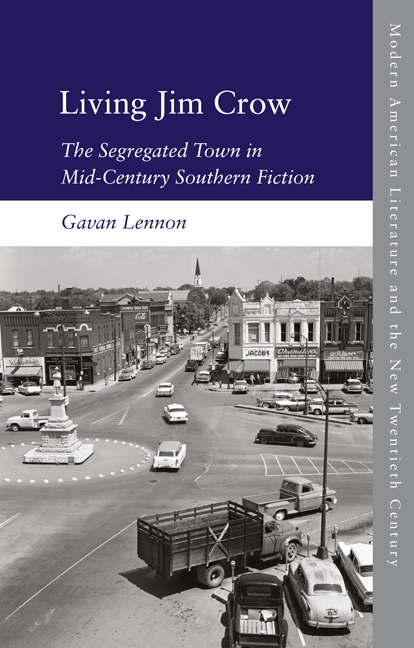Book contents
- Frontmatter
- Contents
- Acknowledgements
- Introduction: Uncovering a Poetics of Protest
- 1 Creators of the Small Town: Anthropology, Racial Etiquette and African American Fiction in the 1930s
- 2 The White Town/Coloured Town Paradigm: Lillian Smith’s Maxwell
- 3 An Anatomy of Critique: Byron Herbert Reece’s Tilden
- 4 The Milan Cycle: Carson McCullers’s Milan
- 5 Breaking the Pencil: William Faulkner’s Jefferson
- 6 Knowing How to Curse: William Melvin Kelley’s Sutton
- Conclusion: (De)Generative Ground – The Field and the Segregated Town
- Notes
- Bibliography
- Index
5 - Breaking the Pencil: William Faulkner’s Jefferson
Published online by Cambridge University Press: 15 October 2020
- Frontmatter
- Contents
- Acknowledgements
- Introduction: Uncovering a Poetics of Protest
- 1 Creators of the Small Town: Anthropology, Racial Etiquette and African American Fiction in the 1930s
- 2 The White Town/Coloured Town Paradigm: Lillian Smith’s Maxwell
- 3 An Anatomy of Critique: Byron Herbert Reece’s Tilden
- 4 The Milan Cycle: Carson McCullers’s Milan
- 5 Breaking the Pencil: William Faulkner’s Jefferson
- 6 Knowing How to Curse: William Melvin Kelley’s Sutton
- Conclusion: (De)Generative Ground – The Field and the Segregated Town
- Notes
- Bibliography
- Index
Summary
On 14 June 1962 William Faulkner's publisher at Random House, Bennett Cerf, received a letter from entertainment lawyer Benjamin Aslan. Aslan was keen to discuss the ‘musicalization of Mr. Faulkner's work’ The Reivers (1962), published earlier that month. The letter apparently followed a telephone conversation between Cerf and Aslan and negotiations for an adaptation were far enough along for Aslan to enclose copies of a proposed agreement. Faulkner was, to judge from Cerf 's response, amenable to the suggestion. It seems likely that the adaptation would have gone ahead had the author not died following a horse-riding accident less than three weeks later on 6 July 1962. The Nobel laureate's fiction does not, at first glance, seem appropriate subject matter for musical theatre, and it is difficult to imagine another of his novels being ‘musicalised’.
Faulkner's final novel has long been understood, thanks in part to the intervention of the author, as a more easily digestible and humorous work by an otherwise ‘difficult’ modernist. In contrast, I argue that The Reivers is a complex and ironic indictment of backward-looking white supremacist narratives of southern history. By the early 1960s the typology of the fictional southern town that Faulkner had been exploring in the Yoknapatawpha cycle for decades had become a metafictional device through which an attentive reader could interrogate the reliability of a narrator. In particular, Faulkner depicts Jefferson's courthouse square, the centre of the town's social and physical landscape, as a contested space that defines the collective identity of the town.
The novel tells two stories. One, favoured by earlier and traditional Faulkner critics, is an adventure yarn about a young white boy who steals a car, loses it and tries to win it back in a horse race. The boy, Lucius Priest, is joined by Boon Hogganbeck, who featured in the earlier novel Go Down, Moses (1942), and Ned McCaslin, a member of the African American branch of the McCaslin family explored in the same novel. This story, I argue, serves to obscure a more insidious and politically reactionary narrative. Through a framing device, the phrase ‘Grandfather said’ with which the novel opens, Faulkner makes it clear that the adventure is being related by an elderly Priest to his grandson.
- Type
- Chapter
- Information
- Living Jim CrowThe Segregated Town in Mid-Century Southern Fiction, pp. 159 - 182Publisher: Edinburgh University PressPrint publication year: 2020



